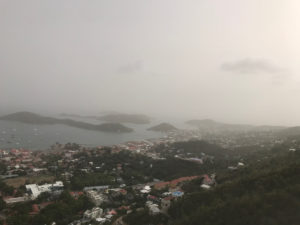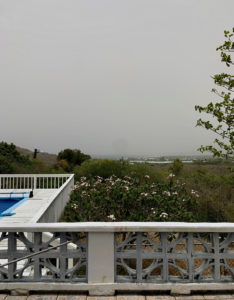
One of the most extreme incursions of Saharan dust in recent history has blown across the Virgin Islands, turning usually blue skies brown and raising concern about health impacts.
The cloud of African dust will also affect the creation of storms over the Atlantic Ocean.
The Saharan Air Layer “is a mass of very dry, dusty air that forms over the Sahara Desert during the late spring, summer and early fall, and moves over the tropical North Atlantic,” according to the NOAA Atlantic Oceanographic and Meteorological Laboratory. The layer formed last week off the coast of Africa.
On Monday night, VITEMA utilized its Alert V.I. system to inform residents that the Saharan Dust Event will last at least until Thursday, with the highest concentration occurring Tuesday night. Visibility will be reduced to four to eight miles, and there will be above average temperatures, with the heat index reaching 100 degrees. The event also poses an increased risk to human health, especially those with preexisting respiratory conditions.

Tradewinds blow the dust cloud across the Atlantic and into the Caribbean before it makes its way to the mainland United States, a 5,000-mile journey which can happen a few times a year between mid-June and mid-August.
This summer’s cloud is abnormally dense, the highest concentration in the region in the past 50 to 60 years, according to Dr. Olga Mayol of the Institute for Tropical Ecosystem Studies at the University of Puerto Rico.
Shaun Pennington of the Source and longtime resident of St. Thomas said, “I have not seen this kind of air quality disturbance since the Monserrat volcano erupted in the mid-90s and spewed ash all the way to the V.I.”
First noticed over the Virgin Islands on Saturday, the negative effects of the cloud’s high concentration were addressed in a statement by the Puerto Rico Health Department.

“People with allergies and other respiratory conditions, as well as those who have been infected with COVID-19, must be very careful not to aggravate their health conditions,” said Ibis Montalvo Felix, manager and coordinator of the Asthma Program of the Department of Health, in the statement.
Felix recommended, “staying hydrated and staying home, as much as possible, so as not to be exposed to particulate matter; avoiding outdoor activities for prolonged periods of time; and wearing a mask when going out in public places.”
David Wally, a meteorologist for the National Weather Service, mentioned that in the short-term the dust creates an environment that “limits thunderstorm and cloud development, which are needed for the development of tropical cyclones.” A New York Times article about the Saharan dust on Monday noted that the effects of curtailing hurricanes are not long-term.
The massive dust cloud is grabbing attention across the nation as it is expected, by the end of the week, to reach states that border the Gulf of Mexico.
The extra colorful skies of last week was a precursor that the dust cloud was approaching, as more vivid sunrises and sunsets are an added benefit of the dust because “added dust in the atmosphere, a greater number of particles can refract sunlight into a range purple, pinks, oranges and yellows,” according to a USA Today article about the effects of the Saharan dust.





